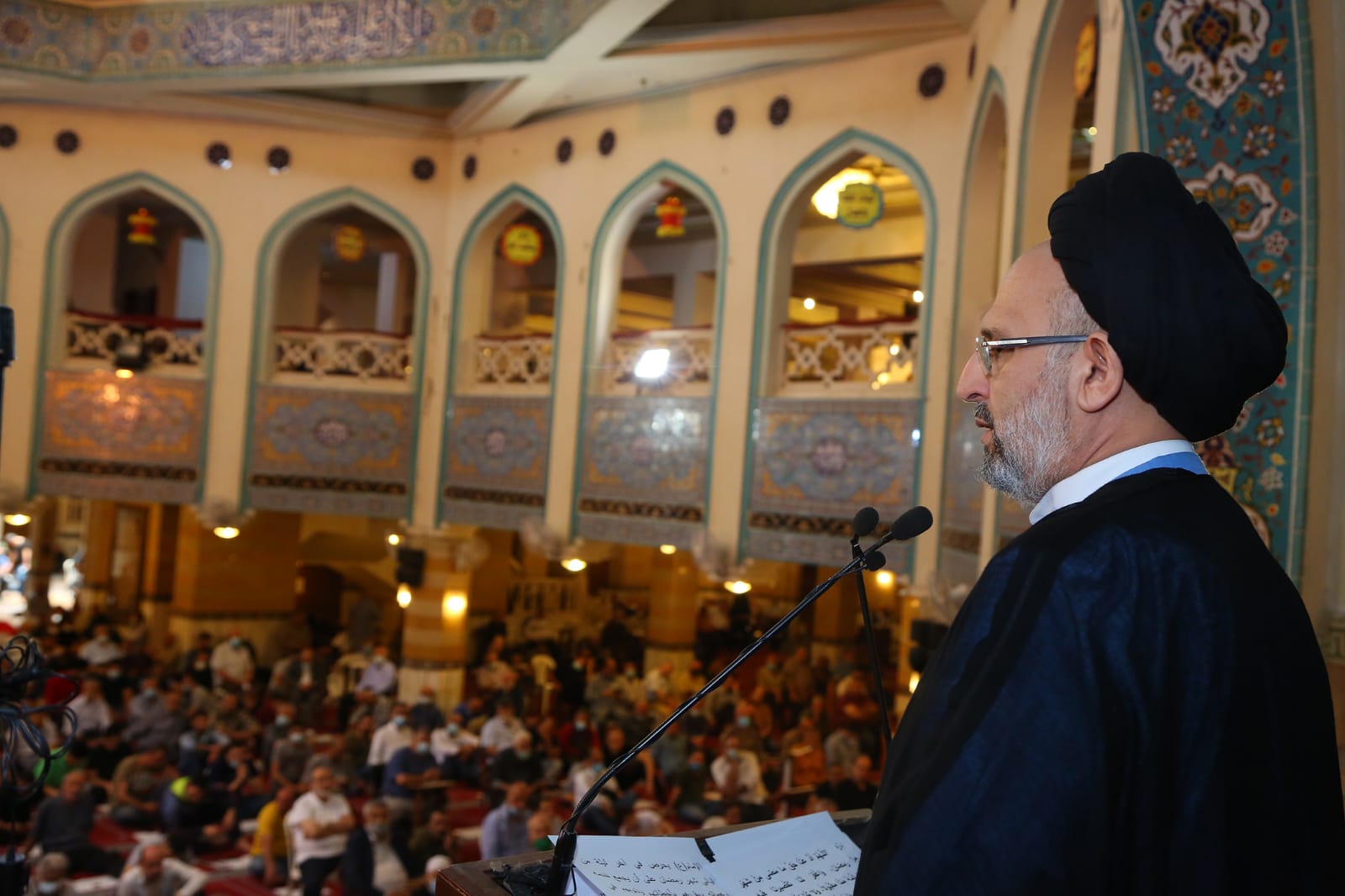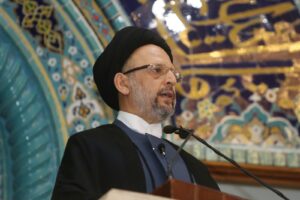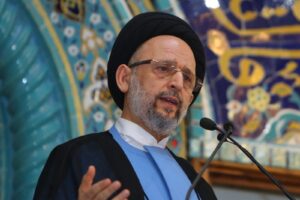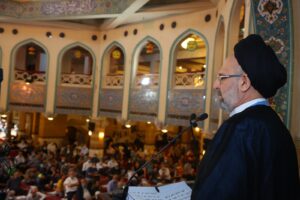Refraining from Harm
In the name of Allah, the Compassionate, the Merciful
His Eminence, Sayyed Ali Fadlallah, delivered the two Friday prayer sermons at the Imamain Al-Hassanain Mosque; Jamada I 25, 1447H/ October 14, 2025. Several prominent religious scholars, dignitaries and hundreds of believers attended the Jumu’a prayer. Following is summary of his sermons
Refraining from Harm:
Allah, the Most Exalted, said in His Glorious Book:
“And those who harm believing men and believing women for something other than what they have earned have certainly borne upon themselves a slander and manifest sin.”
Allah, the Most Exalted, has spoken the truth.
This Ayat came to warn the believers against being a cause of harm to others. The believer is called upon to refrain from harming all people, even those who differ in religion, sect, or political position — whatever the form of harm may be: material, physical, or moral — whether it is by the hand, the tongue, a look, or an act.
He must also not harm others by raising his voice, or the volume of his car radio or speaker, or by parking his car in the middle of the road in a way that blocks traffic, or by violating traffic rules in a way that obstructs the movement of others, or by throwing garbage in the street or putting it outside the designated place. This includes damaging public property or the environment that people benefit from.
The prohibition of harm does not stop with humans, for it extends even to animals. It was mentioned in a narration that a woman was punished because of a cat which she tied up until it died of thirst.
And in another narration: The Messenger of Allah (p.) forbade killing any living creature except if it causes harm.
Yes — harm may be permissible when it is to repel the harm or aggression of others and when there is no other way but to respond.
Islam has considered refraining from harming others as the criterion that distinguishes a Muslim from others. The Muslim, as indicated by the hadith from the Messenger of Allah (p.), is one from whose hand and tongue people are safe.
When he (p.) was asked: “Which Muslim is the best?” he said: “The one from whose tongue and hand the Muslims are safe.”
The Messenger of Allah (p.) expressed this further when a woman known for praying and fasting abundantly was mentioned before him. He (p.) said about her, knowing her condition: “There is no good in her; she is in the Fire.” They said: “O Messenger of Allah, how so, when she fasts and prays a lot?” He said: “I know that, but she harms people with her tongue.”
He (p.) also rebuked two people whom he saw talking secretly in the presence of others, saying:
“If you are three, then let not two of you converse secretly excluding the third, except with their permission, for that would grieve him.”
The hadiths have shown the great danger of causing harm to believers. In a Divine hadith (hadith qudsi):
“Let him be prepared for war from Me who harms My believing worshiper…”
And the Messenger of Allah (p.) said:
“Whoever harms a Muslim has harmed me, and whoever harms me has harmed Allah.”
And the Qur’an includes those in its saying:
“Indeed, those who abuse Allah and His Messenger—Allah has cursed them in this world and the Hereafter and prepared for them a humiliating punishment.”
Hadiths indicate that Allah, the Most Exalted, may forgive sins that concern His own right, for He promised to forgive all sins when He said:
“Say, O My worshipers who have transgressed against themselves, do not despair of the mercy of Allah. Indeed, Allah forgives all sins. Indeed, it is He who is the Forgiving, the Merciful.”
However, the harm done to people is not forgiven unless those harmed forgive it in this world. If they do not forgive, then on the Day of Judgment, the one who caused harm will have his good deeds taken and given to those he harmed; and if he has no good deeds left, some of the sins of those he harmed will be transferred to him until full justice is done.
It is narrated that the Messenger of Allah (p.) once sat with his companions and said:
“Do you know who the bankrupt is?”
They said: “The bankrupt among us is the one who has neither money nor goods.”
He (p.) said: The truly bankrupt among my nation is the one who comes on the Day of Resurrection with prayer, fasting, and charity, but has insulted others, slandered others, consumed the wealth of others, shed the blood of others, and struck others. On that day, some of his good deeds will be given to those he wronged; and if his good deeds run out, their sins will be taken and added to his account.”
.
He (p.) also said to his companions:
“Whoever has wronged his brother in his honor or anything else let him seek his forgiveness today before there is neither dinar nor dirham; for if he has good deeds, they will be taken from him in proportion to his wrongdoing, and if he has no good deeds, the sins of his brother will be taken and cast upon him.”
And in another hadith:
Whoever wrongs another in his honor, property, or any of his rights must seek forgiveness in this world, for the reckoning in the Hereafter is severe when it comes to rights and injustices
The Holy Qur’an considered that charity has no value or weight before Allah — despite its great importance and His command to give it — if it is accompanied by harm or insult toward those who receive it.
He, the Most Exalted, said:
“O you who have believed, do not invalidate your charities with reminders or injury.”
He made this a condition for obtaining its reward, saying:
“Those who spend their wealth [in Allah’s way] by night and by day, secretly and publicly, will have their reward with their Lord. And no fear will there be concerning them, nor will they grieve.”
The gravity of harm increases before Allah, the Most Exalted, when it affects one’s parents, relatives, neighbors, those who hold positions of faith or knowledge, or when it has broad social consequences, causing tension, problems, and discord.
Islam did not stop at calling believers not to cause harm; it also called them to remove harm when it reaches their knowledge or occurs in their presence.
A person must lift harm from others: by defending them if they are wronged, or by standing up for them if they are insulted or by removing any harm from the public road, and by rushing to help those whose homes or possessions are threatened.
Hence, it is narrated from the Messenger of Allah (p.):
A man passed by a branch on a road and said, “By Allah, I will remove this from the way of the Muslims so that it does not harm them.” So he was admitted to Paradise.
And he (p.) said:
“The deeds of my nation were presented to me, and I found among the good of their deeds the removal of harm from the road.”
And in another narration:“Faith has over seventy branches — the highest of them is saying ‘There is no god but Allah,’ and the lowest of them is removing harm from the path.”
He (p.) also said:
“Whoever defends a group of Muslims against the danger of water or fire, Paradise becomes obligatory for him.
Dear loved ones, Allah, the Most Exalted, wanted the believer to be a source of safety and peace in any society he lives in — that others should not fear any harm from him, but rather feel tranquility in his presence and safety from his harm.
As the Messenger of Allah (p.) said:
“The believer is one whom people trust regarding their lives and properties.”
Everyone — humans, even stones, trees, plants, and animals — should be safe from him.
This was further reinforced when Islam called the believer to make his greeting to others “peace” — and to respond with the same when greeted — and when he is instructed in his prayer to say:
“Peace be upon you and the mercy of Allah and His blessings.”
This is a declaration that his conduct with others in life must be governed by peace with all, and that he must be a source of good wherever he is — as Imam Ali (a.s.) said:
“Associate with people in such a way that if you die, they weep for you, and if you live, they long for you.”
We are in utmost need to strengthen this value in our lives — to reduce tensions and problems that have spread in our streets, homes, and society — so that we may build a strong and cohesive society where everyone supports one another.
Its title is what the Messenger of Allah (p.) pointed to:
“The example of the believers in their affection, mercy, and compassion for one another is like that of a body: when one limb suffers, the whole body responds with sleeplessness and fever.”
And we ask Allah, the Exalted, to aid us in this by saying:
“O Allah, restrain my desire from every forbidden thing, turn away my greed from every sin, and prevent me from harming any believing man or woman, any Muslim man or woman, and all people.”
In the Name of Allah, the Most Compassionate, the Most Merciful
Second Sermon
Worshipers of Allah, I advise you and myself with what the Messenger of Allah (p.) advised his companions when he said:
“By Him besides whom there is no god, no believer has ever been given the good of this world and the Hereafter except through his trust in Allah, his hope in Him, his good character, and refraining from backbiting the believers. And by Him besides whom there is no god, Allah does not punish a believer after repentance and seeking forgiveness except because of his lack of trust in Allah, his weak hope, his bad character, and his backbiting of believers. And by Him besides whom there is no god, no believing servant trusts Allah except that Allah was as His servant thought of Him, for Allah is Generous, and in His hand are all good things; He feels shy that His believing servant should have a trust in Allah, the Most Exalted, , then He would disappoint his expectation and hope. So think well of Allah and desire from Him.”
So, let us take the advice of the Messenger of Allah (p.) and act upon it — so that we may be capable of attaining what is with Allah,
“And what is with Allah is better.” And to become more aware and able to face challenges.
We begin with the Israeli aggressions which do not seem to stop — rather, we fear they may increase. We witness them in the raids that have targeted many regions, the most recent of which were yesterday’s attacks in the Bekaa and the South, which terrified children sitting in their classrooms, and led to the martyrdom of many civilians — in addition to the ongoing series of assassinations and aggressive acts in the southern border villages to prevent residents from returning safely to their homes.
Here, we must salute the people of the border villages who insisted on returning to their towns and remaining in them despite all the dangers they face — preserving them and expressing their love for their land, even though the conditions for a dignified life are not sufficiently available.
We call upon the state to bear its responsibilities by extending a helping hand to them, to settle them in their villages and protect their security and well-being. We also appreciate the efforts made by institutions and associations that feel a sense of responsibility toward them, despite all the blockade and restrictions.
At this time, the threats of war against Lebanon are escalating. There have been signals of this through the unprecedented number of reconnaissance drones that have violated Lebanese airspace — from the South to the North, from East to West — flying at low altitude, even over official state buildings.
This was accompanied by military maneuvers held near the Lebanese borders, along with threats issued by the enemy’s generals and military leaders, reinforced by statements from the American envoy granting the Zionist entity freedom to escalate its war against Lebanon, and linking any financial or economic aid, reconstruction, or the return of prisoners in the occupation’s jails to Lebanon’s compliance with its obligations — which are, in fact, obligations that serve the Zionist entity’s interests.
It has become clear that the purpose of all these intimidations is to push Lebanon to surrender to the enemy’s conditions and dictates — which have no limits. This requires the Lebanese to rise to the level of these challenges and dangers, which target their security, economy, and sovereignty over their land and villages.
We are confident that the Lebanese, through their unity, solidarity, and mobilization of their elements of strength — not by undermining them — are capable of standing against what is being plotted for them.
Therefore, we call on them to quickly resolve their internal disputes which, sadly, have become their daily bread — to prevent the enemy from exploiting any contradictions that may appear on the level of the state or the people, or from isolating and targeting one group of Lebanese, under the pretext that the problem is with that group and not with others.
We want the Lebanese to look with awareness and responsibility at what is happening around them, not to underestimate its consequences for their country, and not to forget that this entity is an enemy to all the Lebanese components and groups that hold in their hearts a firm belonging to this homeland.
We also call on the Lebanese state, responsible for its citizens, not to remain absent from what is happening — but to be fully present, with all its components, not limiting its role to issuing statements of condemnation of the enemy’s crimes and aggressions, thinking that by doing so it has fulfilled its duty — but rather to unite its efforts to face any possible developments on the security, economic, and financial levels, by having an emergency plan at all levels.
At the same time, it must mobilize its political and diplomatic efforts and all its relations to work to protect the country from any aggression.
We do not underestimate the heavy pressures being imposed on the Lebanese state and people, or the extensive international cover that this enemy enjoys — but this should not lead to submission to its dictates or acceptance of what it wants.
Our country is not as weak as some portray it to be, nor as some believe. Its land, soaked with the blood of its sons, bears witness to that, as does its ancient and modern history.
We return to Gaza, which awaits the coming stage to implement the agreement. We hope that through it, the aspirations of the Palestinian people will be achieved — to have control over their land and the right to self-determination.
At the same time, we warn against the enemy’s ongoing attempts to evade any commitments toward this people. Just as it worked to circumvent the first phase after recovering its captives — and we saw the air raids that claimed more victims — it will also work to disable the effects of this new phase, to complete its project of eliminating the Palestinian cause from its roots: by destroying what remains of Gaza and displacing its people. It also seeks to continue this plan in the West Bank, which it has begun legitimizing through the preliminary decision of the Knesset to annex it to its entity.
This calls on the Arab and Islamic countries and all the free people of the world to continue standing with the Palestinian people and supporting them until they gain their legitimate rights over all their land.





